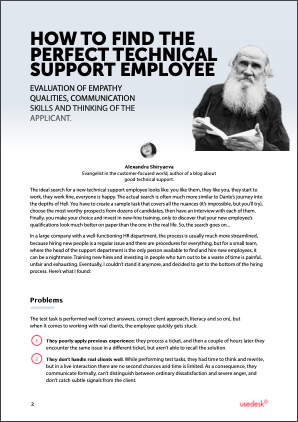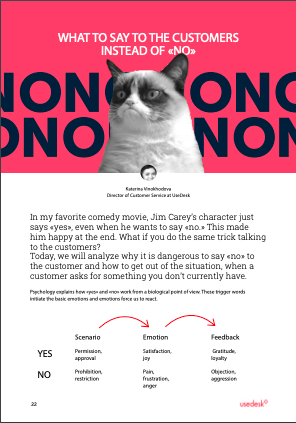Request a Demo
Send us a request for an online demonstration at the time that's convenient for you. We will give you an overview and answer any questions you may have about the system.
By clicking the button, you agree that you have read our Privacy Policy
QUALITY STANDARDS OF GOOD CUSTOMER SUPPORT

Katerina Vinokhodova
Usedesk Co-Owner
In my blog, I write a lot about customer support techniques and tools. You can create great customer support even without using any sophisticated techniques. To start with, you will need Excel, Outlook, and a cell phone. What matters is an attitude. Today, we will sort things out, and we will figure out what the attitude towards customer support should be and how to build that attitude in your company.
Define the principles
Open a website of any company; I bet you will find "we provide high-quality customer service" there. At the same time, my Facebook feed daily shows the posts in which friends complain about a terrible service - in a cafe, a hospital, a taxi, or a #1 mobile service operator. These unfunny stories accompanied by the "expectation vs. reality" memes appear in two cases:
1) a company does not do what it promised
2) understanding "good service" is not the same for a customer and a company.
To narrow down the gap between customer's and company's views, discuss with the team how your company sees a great service: these are the things we do, and these – we do not. As a result, you will have a list of customer support principles. Note, if the principles are vague and ambiguous, no one will follow them. Describe the specific situations so that the customer support agents clearly understand how to act by principles.
1) a company does not do what it promised
2) understanding "good service" is not the same for a customer and a company.
To narrow down the gap between customer's and company's views, discuss with the team how your company sees a great service: these are the things we do, and these – we do not. As a result, you will have a list of customer support principles. Note, if the principles are vague and ambiguous, no one will follow them. Describe the specific situations so that the customer support agents clearly understand how to act by principles.
Vague
We keep our promises.
We provide the consultations of high quality.
We exceed the expectations.
We solve problems.
We are friendly.
We cut down the customer efforts.
We do everything we can to help.
We keep our promises.
We provide the consultations of high quality.
We exceed the expectations.
We solve problems.
We are friendly.
We cut down the customer efforts.
We do everything we can to help.
Specific
We never set a deadline unless we are sure.
If you do not know the answer, it is better to pause and clarify the details to get back with the right solution.
We say we would do it by tomorrow, but actually, we will do it tonight.
Sometimes, what a customer asks for and what he needs are not the same things. We see the essence of the problem behind the words and emotions of the customer.
We put ourselves in the customer's shoes and view the problem as a story.
We do not redirect the customer to other channels and departments unless there are reasons for doing so.
We never say - "this is not in our competence." If we cannot help, we let you know who can.
We never set a deadline unless we are sure.
If you do not know the answer, it is better to pause and clarify the details to get back with the right solution.
We say we would do it by tomorrow, but actually, we will do it tonight.
Sometimes, what a customer asks for and what he needs are not the same things. We see the essence of the problem behind the words and emotions of the customer.
We put ourselves in the customer's shoes and view the problem as a story.
We do not redirect the customer to other channels and departments unless there are reasons for doing so.
We never say - "this is not in our competence." If we cannot help, we let you know who can.
When the general principles have been defined, go deeper and set the standards for each step of the process:
Better, ask the customers:
How much they are willing to wait in line.
What communication channels they prefer.
Whether they believe a knowledge base on the website could be helpful.
Start working with these realistic expectations rather than taking approximate numbers from somewhere else.
- How fast should we respond to each channel?
- How long should it take to evaluate a claim?
- What communication style we choose when interacting with customers?
- What should an ideal email reply include?
- Who makes decisions in case of non-standard requests?
- What types of self-service do we offer?
Better, ask the customers:
How much they are willing to wait in line.
What communication channels they prefer.
Whether they believe a knowledge base on the website could be helpful.
Start working with these realistic expectations rather than taking approximate numbers from somewhere else.
In Usedesk, the customers can evaluate each agent's response on a scale of "bad," "ok," and "excellent," also, a customer may explain why he has commended or left negative feedback to an agent. This helps to see the customer support work through the customer's eyes, recognize the mistakes and correct them.
Educate the Agents of Values
Internet provider that serves my area switches off the Internet at noon every day, and I have to contact the support team to make them re-enable the services for me. As I have a big kind heart, I don't aggressively act because I know that tech support is a front line that deals with all kinds of negativity and keep the line of fire.
There are only two types of customer contact centers out there. The first one is where the operators explain the product and teach how to use its features, the other one - constantly apologizes for the inconveniences. Talking with aggressive customers means stress and negativity, which is not easy to handle non-stop, and staff turnover in these contact centers is 120% in six months. You can train the soldiers just at the front line, but there cannot be great support when the product is bad.
One of my friends used to work in the online cosmetics shop's support team, and every time she was talking about her job, she rolled her eyes, saying - "Oh, poor customers! Never buy this bullshit!" That's it. This is a ship that is sinking – time to close the business, without doubts.
The employees should believe in the product, defend the brand and use the product themselves. During the onboarding training, educate the employees of the values and features of the product. Once every quarter, organize a seminar, meeting with product specialists, developers, and marketing professionals. The support staff knows what is happening with the product and can share the customers' reviews collected at the front line. If the employee is sure that the company offers a great product, he tries to help the customer, and, as a result, the customer support acts just like an additional sales department.
There are only two types of customer contact centers out there. The first one is where the operators explain the product and teach how to use its features, the other one - constantly apologizes for the inconveniences. Talking with aggressive customers means stress and negativity, which is not easy to handle non-stop, and staff turnover in these contact centers is 120% in six months. You can train the soldiers just at the front line, but there cannot be great support when the product is bad.
One of my friends used to work in the online cosmetics shop's support team, and every time she was talking about her job, she rolled her eyes, saying - "Oh, poor customers! Never buy this bullshit!" That's it. This is a ship that is sinking – time to close the business, without doubts.
The employees should believe in the product, defend the brand and use the product themselves. During the onboarding training, educate the employees of the values and features of the product. Once every quarter, organize a seminar, meeting with product specialists, developers, and marketing professionals. The support staff knows what is happening with the product and can share the customers' reviews collected at the front line. If the employee is sure that the company offers a great product, he tries to help the customer, and, as a result, the customer support acts just like an additional sales department.
Employees' Loyalty = Customers' Loyalty
Invest in People
Forget about the latest technologies' implementation if you do not have a team of the right people. The best processes and a "unique product at a low price" cannot help if the employee is rude. Answering the questions below can help to start building a great team:
1. What is an 'ideal support agent' for your company?
Who is it - an excellent worker who follows every word of instructions or an employee with non-standard thinking, flexible, and able to adjust the regulations? Depending on the answer, select the methods of training and work control. Do you trust the employees and let them make complicated decisions? What type of instructions you give - detailed and strict, or free and flexible? Do you assess an agent's performance according to the rule "one step aside of the instructions is unacceptable in any way" or encourage employees to formulate the responses on their own? By choosing people for your team, you choose the overall customer support style.
2. Choose between the specialists with experience and growing professionals
The employees with experience have already build up a thick skin, are not sensitive to swearing, and remain calm even under the customer's hysterical pressure. When you offer a job to such a candidate, you do not need to give him technical training, and if the employee has worked in the same field, you can send him right to the battlefield the next day. However, if the employee does not share the company's values, it will be difficult to change it. Later, it will negatively affect his work results also.
Training from scratch is more expensive, but in the long term, it becomes profitable. You take a student, grow him according to your rules. Then you have a strong contact center specialist who knows the product very well and continues to develop your business in other directions. 7 years ago; I started working in a bank's call center. Half of my colleagues over the time have grown from "Hello, my name is Vasya" to the managers of the departments or professionals that are hunted by a good half of the employers on the market. However, they are still staying with their alma mater. You can imagine which bank it is and what type of customer service it provides.
Training from scratch is more expensive, but in the long term, it becomes profitable. You take a student, grow him according to your rules. Then you have a strong contact center specialist who knows the product very well and continues to develop your business in other directions. 7 years ago; I started working in a bank's call center. Half of my colleagues over the time have grown from "Hello, my name is Vasya" to the managers of the departments or professionals that are hunted by a good half of the employers on the market. However, they are still staying with their alma mater. You can imagine which bank it is and what type of customer service it provides.
3. How to motivate?
Working in a contact center means doing repetitive tasks 90% of the time, which is frustrating and preventing oxygen from circulation. To protect your employees from burning out, give them some challenging tasks, discuss the work with them, consider and implement their suggestions. Build a culture within the team, an atmosphere where they would want to grow. Load the employees with knowledge – give the books about the customer service as gifts, and provide training. The job should be interesting and valuable for them.
People are motivated by attention and recognition. If a customer has left positive feedback on the support team, distribute this news via email to other departments to know the heroes of the first line.
People are motivated by attention and recognition. If a customer has left positive feedback on the support team, distribute this news via email to other departments to know the heroes of the first line.
Share with your colleagues:
Did you like this article?
Error get alias
We know a lot about customer service
Once every two weeks, we will send exciting and valuable materials about customer service - articles, cases, and system updates. Do you mind?







